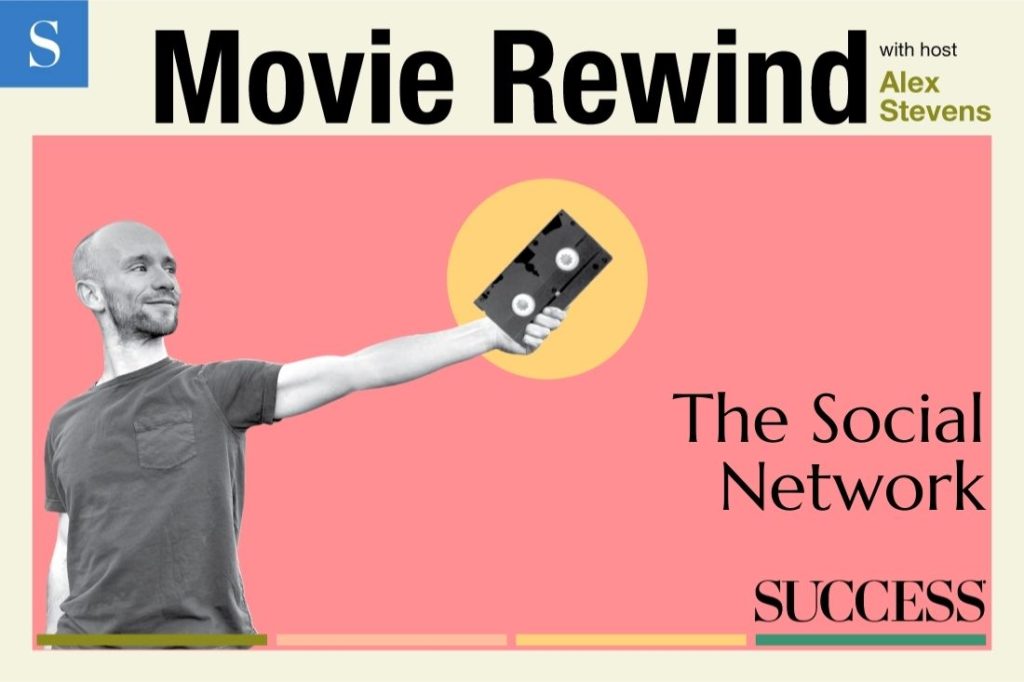Like it or not, Mark Zuckerberg has been a big part of almost everyone’s lives for a while now. It only makes sense that he was going to make an appearance on our podcast. Fortunately, he’s showing up via an award-winning movie and not a tracking cookie or UFO.
Jokes aside, I’m really excited to tackle The Social Network this week. Giant of the screen and stage Aaron Sorkin wrote it, the inimitable David Fincher directed it, and it was as good as you’d expect a movie with that pedigree to be.
As it turns out, this movie has a lot to teach us about what we’re interested in around here—success in life, career and personal development of all kinds. Welcome back to SUCCESS Movie Rewind, the only podcast talking about movies about Zuckerberg and not the man himself. Let’s do this.
Mimetic desire is a two-way mirror.
Most of us have seen this film by now, but here’s the basic outline of the plot: We see the formation of Facebook and the resulting litigation. Along the way, we get a lot of fictionalized insight into Zuckerberg and why he may be the way he is.
Don’t forget: Sorkin wrote this movie, so it’s going to go deep. Right out of the gate, we get struck with a philosophical concept called mimetic desire. There are whole books of philosophy about this single concept, and I recommend reading more on the subject, but here’s the basic idea: The theory of mimetic desire is that no one knows what they want, they just model what they think they want after what they see that others have.
The movie opens with a young Zuckerberg (Jesse Eisenberg) talking with his girlfriend in a bar. He doesn’t know what he wants, but he knows he wants to be someone. And he’s a bubbling cauldron of insecurity. He’s talking endlessly about how he’s going to get ahead, and his girlfriend, somewhat annoyed, says he should just focus on being the best him that he can be. The discussion only continues to unravel, and she ends up breaking up with him right then and there.
Zuckerberg was in the throes of a battle with mimetic desire, and it got the better of him. He lost his relationship as a result. That’s because of our first SUCCESS Movie Memento™ for this week: Mimetic desire is a two-way mirror—you either see yourself in the mirror or you see the person looking through on the other side. That hidden person is who you actually modeled what you want on.
Here’s the thing: Everyone experiences mimetic desire. It can be ugly, but we all go through it. We have to learn to see both sides of the two-way mirror to recognize this feeling in ourselves, deal with it and keep it from becoming a problem.
Sick systems need scapegoats.
Much of the plot of this movie centers around Facebook co-founder Eduardo Saverin (Andrew Garfield), including Zuckerberg’s apparent efforts to squeeze him out of the business and the lawsuit that ensues. Leading up to all the nastiness, we see Napster founder and Silicon Valley bad-boy Sean Parker (played convincingly by Justin Timberlake) swoop in and tell Zuckerberg that he has to be a jerk to get ahead.
And boy, does Zuckerberg listen to him. That sets into motion the formation of an entire hyper-competitive system that eventually chooses Saverin as the scapegoat. It was always going to be someone, and that’s because of our second SUCCESS Movie Memento™ for this film: Sick systems need scapegoats.
We get details in the plot about Saverin which suggest that he is, in fact, just being the best version of himself—the opposite of what we see Zuckerberg doing. Saverin is good with numbers and wants to help out his friend, so he co-founds the company, invests in it and helps run it. He’s not in it to just reach the next milestone on the treadmill of mimetic desire. He’s just doing what he’s good at.
That’s what positions him as a scapegoat. The system Zuckerberg builds around Facebook is sick—it’s a system that says you have to be the best and you have to vanquish people to be the best. Saverin isn’t playing that game, but he becomes the victim of it nonetheless.
What can we all learn from this as we build our careers and lives? A few things: When we build sick systems, someone is going to get hurt, and if we’re caught up in a sick system, we might just end up the scapegoat ourselves.
Watch how you want.
What do you want? If you can answer that question with clarity, you’re far ahead of many of your peers. In The Social Network, we see a Zuckerberg who doesn’t really know what he wants. Ostensibly, he wants his company to succeed. But the success of Facebook is almost never in question—it’s just that the success we see Zuckerberg have feels hollow.
That’s because he’s not watching how he wants. He would have known better if he had listened to our third SUCCESS Movie Memento™ for this week: Watch how you want.
By that, I mean you have to want things with clarity and purpose. Wanting success for the sake of it or because you saw someone else experience it in a way you now want to put you squarely back on that mimetic desire hamster wheel. The next success opens up your world just enough to put a new goal on your horizon—to the point that you never end up where you want to be because you don’t want to be anywhere real.
We see Zuckerberg ultimately emerge victorious from the trials he faces, but we end the film on him sending his ex-girlfriend a friend request on Facebook. He refreshes the page over and over to see if she has accepted. Is it success? We don’t know, but we can be reasonably certain that Zuckerberg is not happy or fulfilled in that moment, despite the wild trajectory of success he has clearly embarked on. Moral of this story? Don’t do that to yourself.
That’s it for SUCCESS Movie Rewind, folks. I want to thank you for taking this journey with me, and though we won’t be seeing each other each week to do motivational movie criticism, I hope you’ll apply what we’ve learned together to your cinema experiences and life experiences years into your wildly successful future. See you around.




